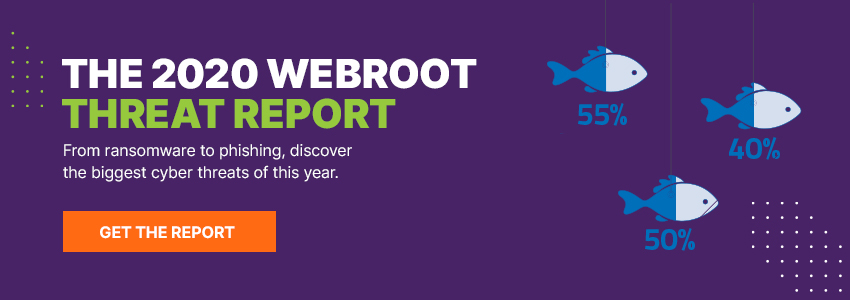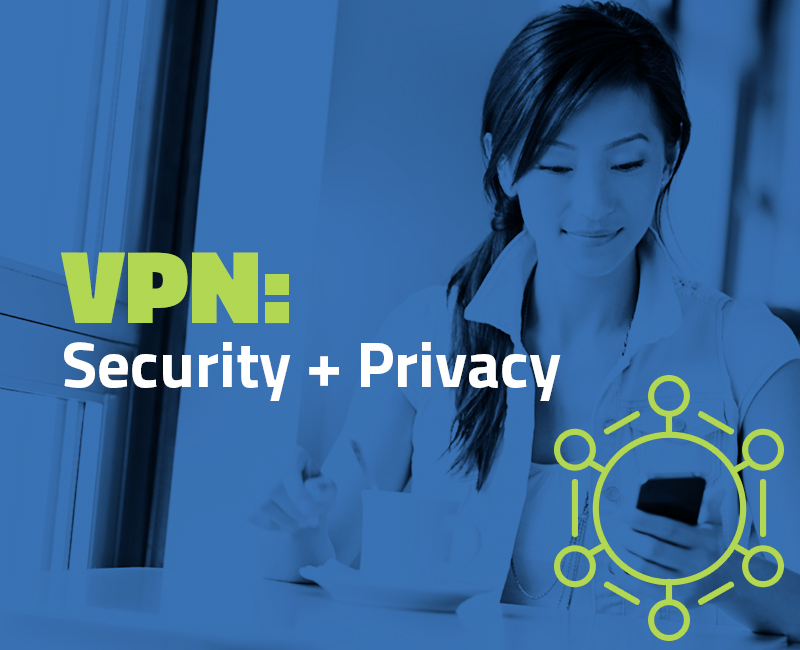Working remotely? It only takes a moment on a free WiFi connection for a hacker to access your personal accounts. While complimentary WiFi is convenient, protecting your connection with a VPN is the best way to stay safe on public networks, keeping your data and browsing history secure.
Are you prepared for today’s attacks? Discover the year’s biggest cyber threats with the annual Webroot Threat Report.
What is a VPN?
VPN stands for “virtual private network” and is a technology that can be used to add privacy and security while online. It’s specifically recommended when using public WiFi which is often less secure and is often not password protected.
VPN’s act as a bulletproof vest for your internet connection. In addition to encrypting the data exchanged through that connection, they help safeguard your data and can enable private and anonymous web browsing. However, even if you’re using a VPN, you must still be careful about clicking on suspicious links and downloading files that may infect your computer with a virus. Protecting yourself with antivirus software is still necessary.
When and why should you use a VPN?
When checking into your hotel, connecting to the WiFi is often one of the first things you do once settling in. While it may sound like a tempting offer, logging in to an unsecured connection without a VPN is a very bad idea. In July, ZDNet reported the return of hacker group DarkHotel which aims to target hotel guest’s computers after they have logged on to the building’s WiFi. Once compromising a guest’s WiFi, the hacker group can then leverage a series of phishing and social engineering techniques to infect targeted computers.
Traveling and lodging is just one example of when you can use a VPN to help stay secure and avoid potential attacks, however anyone can benefit from using a VPN.
From checking Facebook on an airport hotspot, accessing your company files while working remotely or using an open network at your local coffee shop, regardless of the scenario, using a public WiFi can potentially put the data you’re sending over the internet at risk. For business looking to secure their guest WiFi, click to learn more about our DNS protection solution.
Ready to take back control of your privacy? Webroot WiFi Security is compatible with devices running iOS®, Android™, macOS® and Windows® operating systems, and is now available to download on the Apple App Store, Google Play™ store, and Webroot.com.








How do you get a VPN
Great question, Shirley!
You can purchase a VPN from a reputable company’s Website. Lucky for you, our awesome friends over at PCMag have compiled a list of The Best VPN Services of 2017!
I hope this is helpful!
Great information. Any reason that you didn’t include source link to learn how to set up a VPN?
Great question, Sheldon!
Webroot does not currently partner or offer any VPN services. I like to let people know that our awesome friends over at PCMag have compiled a list of The Best VPN Services of 2017.
That should get you in the direction you’re looking for! 🙂
You should mention that while there is risk in using an open or un-verified wireless network, there is also risk in using a VPN from an unknown vendor. All your traffic traverses the VPN to hide your activity from monitoring on the wireless network, but now you are just giving the vendor that provides the VPN service all your traffic to inspect. Do you trust the VPN vendor? If you do trust them, what do they record? It would probably be best to install your own VPN firewall at home/office and then VPN to that. That way, all your traffic goes across your VPN and then the Internet connection at the home/office. No other vendors involved, except your home/office ISP.